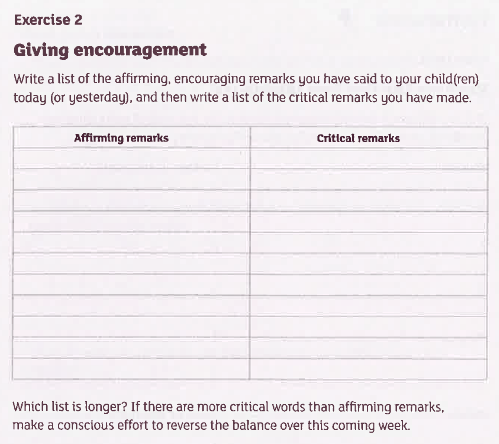Loading Content...
Share a Link to this Message
The link has been copied to your clipboard; paste it anywhere you would like to share it.
CloseParenting Teens - August 27, 2012
Day 11 - Love Languages

Teenagers needs the confidence that comes from knowing they are loved. Their behaviour often acts like a gauge showing how full of love their internal “emotional tank” is. Today, we introduce the concept of the five love languages as a way of expressing love to our teenagers in order for them to feel loved.
Our teenagers’ greatest need is to feel loved and accepted during this enormous transition in their lives a time of:
• self- discovery
• pushing for independence
• much self-questioning
• peer pressure
they can experience a lot of self-doubt and feel awkward and unlovable
• confidence rests on:
• security (knowing they are loved)
• self-worth (knowing they are of value)
• significance (knowing there is a purpose to their lives)
• seek to keep their emotional tank" full of lOVE:
• their behavior acts like the gauge to show how full of love they feel
Knowing that they are loved and accepted enables them in the long-term:
• to resist peer pressure when they need to
• to make good choices
• to build close relationships
Discovering how our teenagers feel loved
discover the primary way each teenager feels loved, whether it's through:
• time
• words
• touch
• presents
• actions
(see Gary Chapman, The Five Love Languages of Teenagers)
• importance of a particular love language may have changed as a child has grown older
Question:
Which of the five ways of expressing love was most important for you during your upbringing?
From Series: Parenting Teenagers | More Messages from Parenting Teens | Download Audio
From Series: "Parenting Teenagers"
More Messages Associated With "Family"...
| Day 1 - Introduction | August 13, 2012 | Watch | Listen | ||
| Day 2 - Challenges | August 14, 2012 | Watch | Listen | ||
| Day 3 – Family Provides Support | August 15, 2012 | Watch | Listen | ||
| Day 4 – Family Provides Fun & A Moral Compass | August 16, 2012 | Watch | Listen | ||
| Day 1 - Introduction | August 17, 2012 | Watch | Listen | ||
| Day 5 – Experiencing & Observing Healthy Relationships | August 17, 2012 | Watch | Listen | ||
| Day 2 - Making Adjustments | August 18, 2012 | Watch | Listen | ||
| Day 6 – Practicing Healthy Relationships (and Parenting Alone) | August 18, 2012 | Watch | Listen | ||
| Day 3 - Making Adjustments Part II | August 19, 2012 | Watch | Listen | ||
| Day 7 – Setting Goals and The Importance of Play | August 19, 2012 | Watch | Listen | ||
| Day 4 - Understanding the Pressures | August 20, 2012 | Watch | Listen | ||
| Day 8 – Screentime | August 20, 2012 | Watch | Listen | ||
| Day 4 - The Third and Fourth Seasons of Marriage - Autumn and Winter | Marriage Course | August 20, 2012 | Watch | Listen | |
| Day 5 - Remembering our Long Term Aim | August 21, 2012 | Watch | Listen | ||
| Day 9 – The Importance of Bonding | August 21, 2012 | Watch | Listen | ||
| Day 6 - Home - A Place of Safety and Acceptance | August 22, 2012 | Watch | Listen | ||
| Day 10 – The Importance of Establishing Routines | August 22, 2012 | Watch | Listen | ||
| Day 7 - Home - A Place to Learn Good Values | August 23, 2012 | Watch | Listen | ||
| Day 11 – Bedtimes | Parenting Children | August 23, 2012 | Watch | Listen | |
| Day 8 - Home - A Place of Fun | August 24, 2012 | Watch | Listen | ||
| Day 12 – Introduction to the Love Languages | August 24, 2012 | Watch | Listen | ||
| Day 8 - Nurture Each Other | Marriage Course | August 24, 2012 | Watch | Listen | |
| Day 13 – Introduction to the Love Languages II | Parenting Children | August 25, 2012 | Watch | Listen | |
| Day 9 - The Art of Communication | Marriage Course | August 25, 2012 | Watch | Listen | |
| Day 9 - Home - A Place to Learn Good Relationships | August 25, 2012 | Watch | Listen | ||
| Day 14 – Love Language – Affirming Words | Parenting Children | August 26, 2012 | Watch | Listen | |
| Day 10 - Effective Communication | Marriage Course | August 26, 2012 | Watch | Listen | |
| Day 10 - Family and Meal Times | August 26, 2012 | Watch | Listen | ||
| Day 15 – Love Language – Affectionate and Appropriate Touch | Parenting Children | August 27, 2012 | Watch | Listen | |
| Day 11 - The importance of listening | Marriage Course | August 27, 2012 | Watch | Listen | |
| Day 11 - Love Languages | Parenting Teens | August 27, 2012 | Watch | Listen | |
| Day 16 – Love Language – One to One Time | August 28, 2012 | Watch | Listen | ||
| Day 12 - Love Language - One to One Time | Parenting Teens | August 28, 2012 | Watch | Listen | |
| Day 17 – Love Language – Thoughtful Presents | Parenting Children | August 29, 2012 | Watch | Listen | |
| Day 12 - Hindrances to Listening - Filters | Marriage Course | August 29, 2012 | Watch | Listen | |
| Day 13 - Love Language - Affirming Words | Parenting Teens | August 29, 2012 | Watch | Listen | |
| Day 18 – Love Language – Kind Actions | Parenting Children | August 30, 2012 | Watch | Listen | |
| Day 14 - Love Language - Affectionate Touch | Parenting Teens | August 30, 2012 | Watch | Listen | |
| Day 15 - Love Language - Thoughtful Presents | Parenting Teens | August 31, 2012 | Watch | Listen | |
| Day 19 – Summary of the Love Languages | Parenting Children | September 1, 2012 | Watch | Listen | |
| Day 16 - Love Language - Kind Actions | Parenting Teens | September 1, 2012 | Watch | Listen | |
| Day 17 - Effective Communications | Parenting Teens | September 2, 2012 | Watch | Listen | |
| Day 18 - Engaging in Dialogue | Parenting Teens | September 3, 2012 | Watch | Listen | |
| Day 20 - Combining Love and Limits - Why Boundaries Matter | Parenting Children | September 3, 2012 | Watch | Listen | |
| Day 19 - Effective Communications Strategies Part I | Parenting Teens | September 4, 2012 | Watch | Listen | |
| Day 21 - The Challenges of Setting Boundaries | Parenting Children | September 4, 2012 | Watch | Listen | |
| Day 20 - Effective Communications Strategies Part II | Parenting Teens | September 5, 2012 | Watch | Listen | |
| Day 22 - Where do we set boundaries | Parenting Children | September 5, 2012 | Watch | Listen | |
| Day 21 - Effective Communications Strategies Part III | Parenting Teens | September 6, 2012 | Watch | Listen | |
| Day 23 - Setting Boundaries Part I | Parenting Children | September 6, 2012 | Watch | Listen | |
| Day 24 - Setting Boundaries Part II | Parenting Children | September 7, 2012 | Watch | Listen | |
| Day 25 - Helping Children Make Good Choices Part I | Parenting Children | September 8, 2012 | Watch | Listen | |
| Day 26 - Helping Children Make Good Choices Part II | Parenting Children | September 9, 2012 | Watch | Listen | |
| Day 27 - Helping Children Make Good Choices Part III | Parenting Children | September 10, 2012 | Watch | Listen | |
| Day 28 - Helping Children Make Good Choices Part IV | Parenting Children | September 11, 2012 | Watch | Listen | |
| Day 29 - Modeling and Practicing Relationships - The Power of Listening | Parenting Children | September 12, 2012 | Watch | Listen | |
| Day 30 - The Power of Listening - Part I | Parenting Children | September 13, 2012 | Watch | Listen | |
| Day 31 - The Power of Listening - Part II | Parenting Children | September 14, 2012 | Watch | Listen | |
| Day 32 - Relationships with siblings and other children Part I | Parenting Children | September 15, 2012 | Watch | Listen | |
| Day 33 - Relationships with siblings and other children Part II | Parenting Children | September 16, 2012 | Watch | Listen | |
| Day 34 - Relationships with siblings and other children Part III | Parenting Children | September 17, 2012 | Watch | Listen | |
| Day 35 - Handling anger - Ours and theirs | Parenting Children | September 18, 2012 | Watch | Listen | |
| Day 36 - Helping our children manage their anger - Toddler tantrums | Parenting Children | September 19, 2012 | Watch | Listen | |
| Day 37 - Helping our children manage their anger - Older children Ages 5-10 | Parenting Children | September 20, 2012 | Watch | Listen | |
| Day 38 - Teaching our children to manage their anger | Parenting Children | September 21, 2012 | Watch | Listen | |
| Day 39 - Teaching our children to manage their anger Part II | Parenting Children | September 22, 2012 | Watch | Listen | |
| Day 40 - Encouraging Responsibility | Parenting Children | September 23, 2012 | Watch | Listen | |
| Day 41 - Symptoms of Unhealthy Control | Parenting Children | September 24, 2012 | Watch | Listen | |
| Day 42 - Good Choices - Sex | Parenting Children | September 25, 2012 | Watch | Listen | |
| Day 43 - Good Choices - The Internet, Games, Drugs and Alcohol | Parenting Children | September 26, 2012 | Watch | Listen | |
| Day 44 - Passing on Beliefs and Values - Answering Questions | Parenting Children | September 27, 2012 | Listen | ||
| Day 45 - Passing on Beliefs and Values At Home, With Others and On Money | Parenting Children | September 28, 2012 | Watch | Listen | |
| Day 46 - Praying for our children | Parenting Children | September 29, 2012 | Watch | Listen | |
| Day 47 - Developing family traditions, routines, and rituals | Parenting Children | September 30, 2012 | Watch | Listen | |
| Day 48 - Conclusion | Parenting Children | October 1, 2012 | Watch | Listen |
Powered by Series Engine

- physical contact is vital to a child – for boys as much as girls
- a primary way of conveying our love for our children
- for some parents being demonstrative doesn’t come naturally
- we can all learn
- create daily routines that involve physical affection

How natural do you find it to give affectionate touch to your child(ren)? Does this relate to your own childhood experiences?


1292

